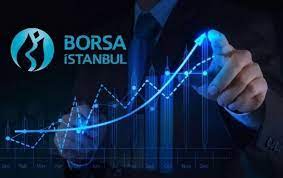Turkey’s main stock index has nearly doubled since veteran leader Recep Tayyip Erdoğan’s surprise re-election in May, and experts forecast the rally can persist until early 2024 at least.
Further gains seem probable as retail investors buy equities to hedge against resurgent inflation and the president’s new finance chiefs convince institutions the country is returning to economic orthodoxy.
Erdoğan had long claimed high interest rates were the cause of, not the cure for, price rises. The central bank steadily reduced rates to 8.5 percent in February from 19 percent in 2021.
These cuts propelled annual inflation to peak at 85.5 percent last October, but interest rates are now on the rise again.
The best option
Investors typically keep most of their money in foreign currencies and gold. Much of the remainder went into housing, which led the residential price index to increase about fivefold from 2021, economic data website Trading Economics estimates.
As housing became too expensive and the price of cars – another popular inflation hedge – also soared, equities were the prime alternative to holding cash.
Today, there are almost 8 million investors, three times the number a year ago, official data shows. Several small-scale initial public offerings in 2023 also helped to attract new traders.
The stock market in Turkey slid after Erdoğan outperformed expectations in May’s first presidential voting round and his AK Party-led bloc did likewise in the parliamentary poll.
Yet following his re-election, Erdoğan made Mehmet Simsek finance and treasury minister and Hafize Gaye Erkan central bank governor.
As financial industry veterans, their appointments signalled Erdoğan might change economic strategy, sparking a stock rebound.
‘Honeymoon stage’
“Erdoğan revised some of his previous rhetoric, which positively impacted sentiment,” said Serhan Gok, an Istanbul-based economist and fund manager at Arista.
“The new economic team has made some sensible announcements and the market is eager to believe in them after so many years of irrational policies.
“Every small step has a big impact on investor confidence. We’re still in the honeymoon stage.”
In June, the central bank began raising the benchmark rate. This increased to 25 percent in August, far higher than was commonly forecast.
In response, Istanbul’s main stock index hit a record high in early September and was up about 86 percent from late May to September 26.
The Turkish lira has fallen 68 percent against the dollar in the past two years. Even allowing for this, the bourse’s market capitalisation was $318.4 billion on August 31, up from an eight-month low of $253.8 billion in June.
Above-forecast second-quarter corporate earnings also supported the stock rally.
“Domestic demand conditions were very favourable and there wasn’t any significant monetary or fiscal tightening before the election, so that gave companies flexibility to increase prices above inflation,” said Gok.
The same is likely to happen with third-quarter earnings, he said, and so should support a renewed stock rally following a brief sell-off in mid-September.
Finance opportunities
According to Simply Wall St, the top-performing sectors in the past three months were financial services (up 127 percent), energy (109 percent) and technology (94 percent).
The bourse trades at a price-to-earnings ratio of 9.4, below its three-year average of 10.2, Simply Wall St estimates.
With the benchmark rate raised to 30 percent last week, institutional investors seem more assured that Simsek and Erkan have a mandate to tame inflation, slow domestic consumption growth, and normalise monetary policy, rather than these hikes being temporary moves to mollify markets.
“Three months ago, the whole market was very cheap and you could buy anything, but now you should be more selective,” said Tunc Yildirim, managing director at investment firm Ünlü & Co in Turkey.
“The biggest opportunity is in financial stocks, predominantly banks, plus conglomerates that are prime targets for foreign investors because they provide a diversified exposure to the country.”
The banking industry remains cheap, trading at a price-to-book ratio of about 0.6 on 2024 estimates, Yildirim said.
“Our strategy is now based upon a more stable lira. That’s why we’re focused on banks and food retailers,” said Yildirim, noting the latter generate sizeable free cashflow and can deploy this cash to generate investment income on top of their regular profits.
Guldem Atabay, an Izmir-based independent economist, forecasts annual inflation could top 70 percent by year-end and will probably peak at about 85 percent in early 2024. The interest rate is likely to reach 40 percent by December.
“As long as the policy rate is markedly below inflation, it’ll feed into the equity market,” Atabay added.
“Companies’ nominal revenue growth looks good on paper because there aren’t accounting measures for inflation, but as the government succeeds in slowing domestic demand that will start to be reflected in companies’ performance from mid-2024.”
Arabian Gulf Business Insight
